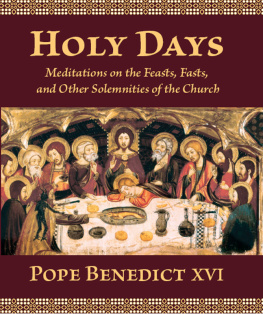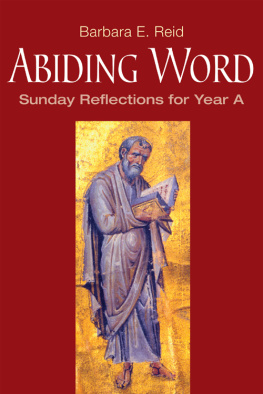Father Gabriel - Divine Intimacy, Vol. 4
Here you can read online Father Gabriel - Divine Intimacy, Vol. 4 full text of the book (entire story) in english for free. Download pdf and epub, get meaning, cover and reviews about this ebook. year: 2011, publisher: Ignatius Press, genre: Religion. Description of the work, (preface) as well as reviews are available. Best literature library LitArk.com created for fans of good reading and offers a wide selection of genres:
Romance novel
Science fiction
Adventure
Detective
Science
History
Home and family
Prose
Art
Politics
Computer
Non-fiction
Religion
Business
Children
Humor
Choose a favorite category and find really read worthwhile books. Enjoy immersion in the world of imagination, feel the emotions of the characters or learn something new for yourself, make an fascinating discovery.
- Book:Divine Intimacy, Vol. 4
- Author:
- Publisher:Ignatius Press
- Genre:
- Year:2011
- Rating:5 / 5
- Favourites:Add to favourites
- Your mark:
- 100
- 1
- 2
- 3
- 4
- 5
Divine Intimacy, Vol. 4: summary, description and annotation
We offer to read an annotation, description, summary or preface (depends on what the author of the book "Divine Intimacy, Vol. 4" wrote himself). If you haven't found the necessary information about the book — write in the comments, we will try to find it.
Divine Intimacy, Vol. 4 — read online for free the complete book (whole text) full work
Below is the text of the book, divided by pages. System saving the place of the last page read, allows you to conveniently read the book "Divine Intimacy, Vol. 4" online for free, without having to search again every time where you left off. Put a bookmark, and you can go to the page where you finished reading at any time.
Font size:
Interval:
Bookmark:
FATHER GABRIEL OF ST. MARY MAGDALEN, O.C.D.
Volume IV
Twenty-second Sunday through the
Thirty-fourth Week of Ordinary Time
IGNATIUS PRESS SAN FRANCISCO
This enlarged and revised edition was
previously published by Dimension Books, Inc.
Translated from the Sixteenth Italian Edition
Carmelite Monastery of Pittsford, N.Y.
With ecclesiastical approval
Carmelite Monastery, Pittsford, N.Y. 14534
All rights reserved
Reprinted with permission of Dimension Books, 1987
ISBN 978-0-89870-145-6
Library of Congress catalogue number 86-83132
Printed in the United States of America
Meditation
On account of sin and its consequences, the service of God brings with it struggle, renunciation, and the overcoming of self. Todays Liturgy gives us a typical example of this. In the first place we see Jeremiahs sorrowful confusion (20:7-9), which expresses the profound distress of a man chosen by God to proclaim is word and, because of this, persecuted endlessly. The prophet goes so far as to declare himself deceived by God, as if fooled by him, because his mission has made him a reproach and derision all day long (ib. 8). Overwhelmed by suffering, he would like to escape from the divine will, yet that is impossible. There is in my heart as it were a burning fire shut up in my bones, and I am weary with holding it in, and I cannot (ib. 9). This mysterious interior fire, a mark of the love of God which has conquered him, even deceived him, and of the prophetic charism with which he has been invested, forces him, against every natural inclination, to continue his thankless mission. It is a splendid example of the power of the divine action in a weak creature.
But the most authoritative demonstration comes in the Gospel (Mt 16:21-27), with the announcement of the passion of Jesus, compared to which the sufferings of Jeremiah are but a tenuous figure. From that timethat is, since Peters profession of faith at CaesareaJesus began to show his disciples that he must go to Jerusalem and suffer many things... and be killed (ib. 21). With characteristic impetuosity, Peter reacts immediately. How can he accept that the Messiah, the Son of the living God, is going to be persecuted and put to death? Peter is only expressing the mentality of the men of every age. According to human reasoning, the more important one is, the more successful he should be, proceeding from victory to victory. But this is not Gods logic, nor the thought of Jesus, who declares he must suffer because the Father has so ruled it in order to redeem the world from sin. And Peter finds himself strongly rebuked: Get behind me, Satan! You are a hindrance to me; for you are not on the side of God, but of men (ib. 23). How tremendous the contrast between these words and those the apostle had heard at Caesarea, when he had acknowledged the messiahship and divinity of Jesus. There it was Blessed are you! and the conferring of the primacy; here, he is called Satan and repulsed. The only reason is his opposition to the passion and death of the Lord. It is easier to acknowledge the Son of God in Jesus than to accept seeing him die as a criminal. But whoever is scandalized by the cross is scandalized by him; whoever rejects his passion rejects him, because Christ is the Crucified . Whoever follows him must accept not only Christs cross, but his own as well. In order to make his disciples understand that it would be an illusion to think they can follow him without carrying their cross with him, Jesus at once adds: If any man would come after me, let him deny himself and take up his cross and follow me (ib. 24). Since sin, this is the only way of salvation for an individual and for the whole of humanity.
I appeal to you therefore, brethren, by the mercies of Godwrites St. Paulto present your bodies as a living sacrifice, holy and acceptable to God (Rom 12:1; 2nd reading). A Christian is not forced to bear his cross; he is a volunteer, who accepts it with love in order to make himself a living and holy sacrifice in union with that of Christ, for the glory of the Father and the redemption of the world. But this is not possible without that profound change in his manner of thinking which will make him think as God does, and thereby become capable of proving what is the will of God (ib. 2), without being scandalized in the face of suffering.
O Lord, you have deceived me and I was deceived; you are stronger than I, and you have prevailed. I have become a laughingstock all the day; everyone mocks me.... For the word of the Lord has become for me a reproach and derision all day long.... There is in my heart as it were a burning fire shut up in my bones, and I am weary with holding it in, and I cannot.... But the Lord is with me as a dread warrior . Jeremiah 20:7-9, 11 If I wish to live with you, O Jesus, I must be convinced that Christian life is synthesized in you crucified, that is, in the spirit of renunciation and sacrifice, practiced in total abandonment and self-denial; only through Calvary can we reach our goal If we meet with grief and struggle along this road, you will sustain us, O Christ, with your cross and help us with your grace. May your words be stamped upon my heart: Whoever would come after me must take up his cross and follow me . My Jesus, your cross is too big for our meager strength; we cannot offer very much to your love; but, O Jesus, accept the offering of our sufferings, help us to unite ourselves to you in the sufferings of your passion that we may be worthy to be united to the glories of your Resurrection. My Jesus, grant that during my whole life I may see my cross as the pledge of your holy love, and the earnest of your merciful kindness, so that, dead and crucified to the world, I may live the life of grace .G. Canovai, Suscipe DomineIn this Sundays Liturgy, the theme of Gods law is treated with remarkable richness. The first reading (Dt 4:1-2, 6-8) presents fidelity to the law as an essential condition for the covenant with God, and hence as a response to his love, through which he made himself so near to his people as to be accessible whenever they sought and called upon him (ib. 7). The observance of the divine precepts neither oppresses nor enslaves, but produces true life based upon a relationship of friendship with God, which leads to possession of the promised land, the symbol of eternal beatitude. And now, O Israel, give heed to the statutes... which I teach you, and do them, that you may live, and go in and take possession of the land which the Lord... gives you (ib. 1). Besides, the practice of the law ennobles man by making him share in the wisdom of God who established it (ib. 6), gives him the security of walking in truth and righteousness, and also the joy of being admitted into his presence. Lord, who will dwell in your abode?sings the responsorial psalmhe who walks with integrity, acts uprightly... who speaks no slander,... who does no evil to his neighbor. In a word, one who follows the divine commandments.
The second reading (Jas 1:17-18, 21b-22, 27) stresses the interior aspect of the law, showing it as the word of truth sown in the heart of man to lead him to salvation. Receive with meeknessSt. James urgesthe implanted word, which is able to save your souls (ib. 21). That same divine word which called man into existence has been implanted in his heart as the law and guide of his life. Therefore we must listen to the voice within us in order to perceive it, and then to be its faithful doer (ib. 22). We would be deceiving ourselves if we were content to know the divine precepts without taking the trouble to translate them into works. The conclusion that follows bears upon the central point of the law: the love of neighbor as the concrete expression of true love of God: Religion that is pure and undefiled before God and the Father is this: to visit orphans and widows in their affliction, and to keep oneself unstained from the world (ib. 27).
Next pageFont size:
Interval:
Bookmark:
Similar books «Divine Intimacy, Vol. 4»
Look at similar books to Divine Intimacy, Vol. 4. We have selected literature similar in name and meaning in the hope of providing readers with more options to find new, interesting, not yet read works.
Discussion, reviews of the book Divine Intimacy, Vol. 4 and just readers' own opinions. Leave your comments, write what you think about the work, its meaning or the main characters. Specify what exactly you liked and what you didn't like, and why you think so.













